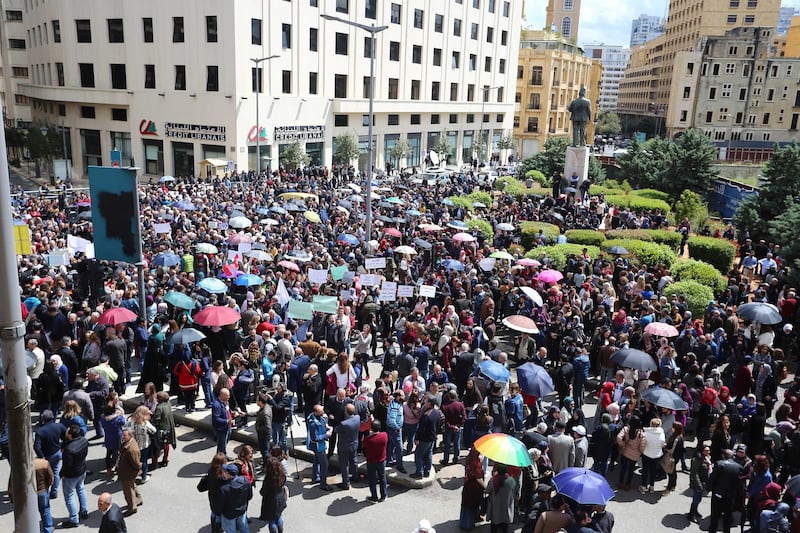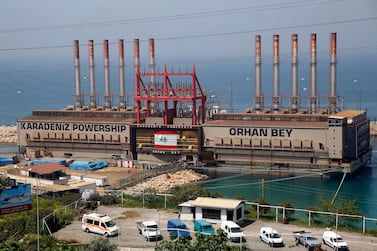Thousands of government employees rallied in front of the Lebanese parliament on Wednesday to warn the government not to cut their salaries after repeated hints that tough austerity measures will be imposed in the name of boosting the economy.
“It’s the first time they dare talk about cutting our salaries. If they go ahead with this, there will be a revolution,” said Michèle Ajaltouni, one of 2,000 tenured professors at Lebanese University, the country’s only public university.
In a country where the government is perceived as corrupt and inefficient, a move to cut salaries would be a “red line”, demonstrators wrote on placards.
“No to starvation politics: no to bailing out the deficit from the pockets of public sector employees,” read one banner.
The government is currently working on the 2019 budget, which will likely include measures to reduce the deficit.
This was one of the many promises made to the international community last year during a donor conference in Paris. The country received nearly $11 billion (Dh40 bn) in pledges to revamp crumbling infrastructure.
Many now fear cuts to the public sector after Foreign Minister Gebran Bassil tweeted on Saturday that salaries should be cut to reduce the country's ballooning $85 bn debt "or there will be no salaries left for anyone."
In late January, shortly after the government formed, it warned of “difficult and painful” reforms ahead.
The state-run National News Agency (NNA), which in a show of solidarity devoted its entire programming to the protests on Wednesday, reported strikes in public schools, hospitals and administrations, one day after retired army officers blocked several highways with burning tyres.
In a rare public criticism of the government, the director of the Tourism Ministry Nada Sardouk also took part in the strike. “We know of the many burdens and debts carried by the state, but the solution is not in the pockets of employees,” she said. “There are other solutions.”
Living conditions in Lebanon are already difficult: 40 per cent of Lebanese live beneath the poverty line, according to a pamphlet distributed by the organisers of a demonstration in front of parliament on Wednesday. According to the UN, nearly a third of Lebanese live on less than $270 a month (DH992).
"The government does not respect social justice," said Issam Khalifeh, a former president of the Lebanese University's teachers' league, speaking in front of parliament.
Like many other demonstrators, Mr Khalifeh argued the money could be saved elsewhere. “Mismanagement at the port of Beirut costs $3 billion a year alone,” he claimed. “Tax evasion also costs $105 million.”
Such data is not readily available in Lebanon, and it was unclear where the unions sourced their figures.
“I hope that the bigger the protest movement, the more this will push the government to find other ways of financing the deficit,” said Youssef Daher, the current president of the Lebanese University’s teachers’ league.
Public sector salaries represent 40 per cent of government’s expenditures, before debt service and subsidies to Lebanon’s national utility company Electricité du Liban (EDL).
Some institutions, such as the nuclear agency and the railroad transport department, have becoming running jokes. They employ hundreds of employees despite there being no nuclear facilities or trains in Lebanon, Nassib Ghobril, chief economist at Byblos Bank, told The National.
"We do not even know how many people are employed in the public sector," said Mr Ghobril. "Thousands are hired without a clear definition of their work. The number one priority should be to address these surplus and 'ghost' employees."
In the past four years alone, 31 000 government employees were hired, according to Mr Ghobril.
In 2017, a parliamentary committee recommended the closure or merger of 86 public agencies, he said, but this has not been followed up.
The sectarian structure of civil employment – in which the government employs Christians and Muslims in equal proportion to their demographic share – will probably represent an additional hurdle to reform. Around 650 people who successfully passed exams to work with the government two years ago have not been hired yet, said Zeina Mshek, a young secondary school teacher, who took part in the demonstration in front of parliament.
“The state will not appoint us to our new jobs because we are 75 per cent Muslim and 25 per cent Christian, and they want a religious balance,” she said, holding a banner reading: “Our only fault is that we are not from the right piece of the pie.”
Demonstrators say the entire Lebanese political system must be overhauled.
"We must start with [getting rid of] our MPs, then our ministers, and our president," said Mrs Ajaltouni, the University teacher. "I'm afraid of nothing. I've lived through the civil war. It's not those idiots who will frighten us."






